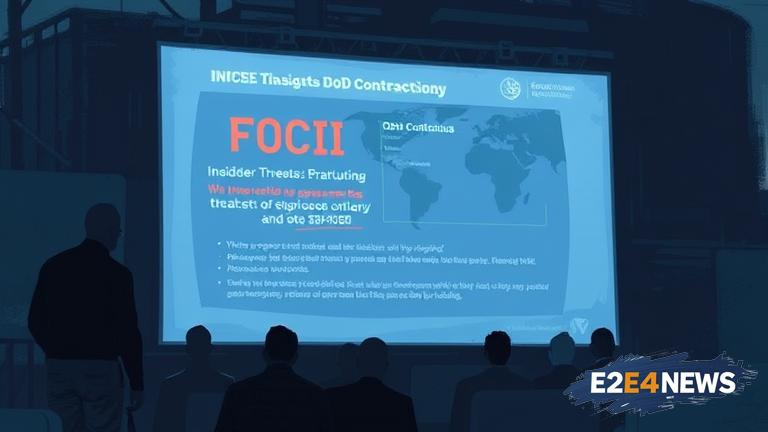The Defense Counterintelligence and Security Agency (DCSA) is working to enhance the security of the defense industrial base by emphasizing the importance of Facility Clearance (FOCI) and mitigating insider threats. According to David Cattler, a key official at DCSA, FOCI is a critical component of the National Industrial Security Program (NISP). The NISP is designed to protect classified information and prevent its unauthorized disclosure. Cattler highlighted the need for contractors to obtain FOCI in order to handle classified information and to ensure the security of their facilities. He also emphasized the importance of mitigating insider threats, which can come from employees or contractors with authorized access to sensitive information. Insider threats can be particularly damaging because they can be difficult to detect and can result in significant harm to national security. Cattler noted that DCSA is working to educate contractors about the risks associated with insider threats and to provide them with the tools and resources they need to mitigate these risks. This includes providing training and guidance on how to identify and report suspicious behavior. DCSA is also working to improve the efficiency and effectiveness of the FOCI process, which can be time-consuming and burdensome for contractors. The agency is exploring new technologies and processes that can help to streamline the FOCI process and reduce the administrative burden on contractors. In addition to its work on FOCI and insider threats, DCSA is also focused on enhancing the overall security of the defense industrial base. This includes working to prevent the unauthorized disclosure of classified information and to protect against cyber threats. Cattler emphasized the importance of collaboration and partnership between DCSA, contractors, and other stakeholders in order to achieve these goals. He noted that DCSA is working closely with the Department of Defense (DoD) and other government agencies to ensure that the defense industrial base is secure and that classified information is protected. The DoD has also implemented various initiatives to enhance the security of its contracting process, including the use of advanced technologies such as artificial intelligence and machine learning. These technologies can help to identify and mitigate potential security risks, including insider threats. Cattler also highlighted the importance of continuous monitoring and evaluation in order to ensure the security of the defense industrial base. This includes regularly assessing the security posture of contractors and identifying areas for improvement. DCSA is also working to provide contractors with the tools and resources they need to implement effective security measures, including training and guidance on how to protect against cyber threats. The agency is also exploring new technologies and processes that can help to enhance the security of the defense industrial base, including the use of blockchain and other emerging technologies. Overall, Cattler’s comments highlight the importance of FOCI and mitigating insider threats in DoD contracting. By working together, DCSA, contractors, and other stakeholders can help to ensure the security of the defense industrial base and protect classified information. The use of advanced technologies and processes can also help to enhance the efficiency and effectiveness of the FOCI process and reduce the administrative burden on contractors. As the defense industrial base continues to evolve, it is likely that DCSA and other government agencies will play an increasingly important role in ensuring its security. This will require ongoing collaboration and partnership between government agencies, contractors, and other stakeholders. The DoD has also emphasized the importance of cybersecurity in its contracting process, and has implemented various initiatives to enhance the security of its systems and networks. These initiatives include the use of advanced technologies such as encryption and firewalls, as well as regular security assessments and evaluations. By prioritizing cybersecurity and mitigating insider threats, the DoD can help to ensure the security of its contracting process and protect classified information. Cattler’s comments also highlight the importance of education and awareness in preventing insider threats. By educating contractors and other stakeholders about the risks associated with insider threats, DCSA can help to prevent these threats from occurring. This includes providing training and guidance on how to identify and report suspicious behavior, as well as how to implement effective security measures. Overall, the security of the defense industrial base is a critical component of national security, and requires ongoing attention and effort from government agencies, contractors, and other stakeholders.
